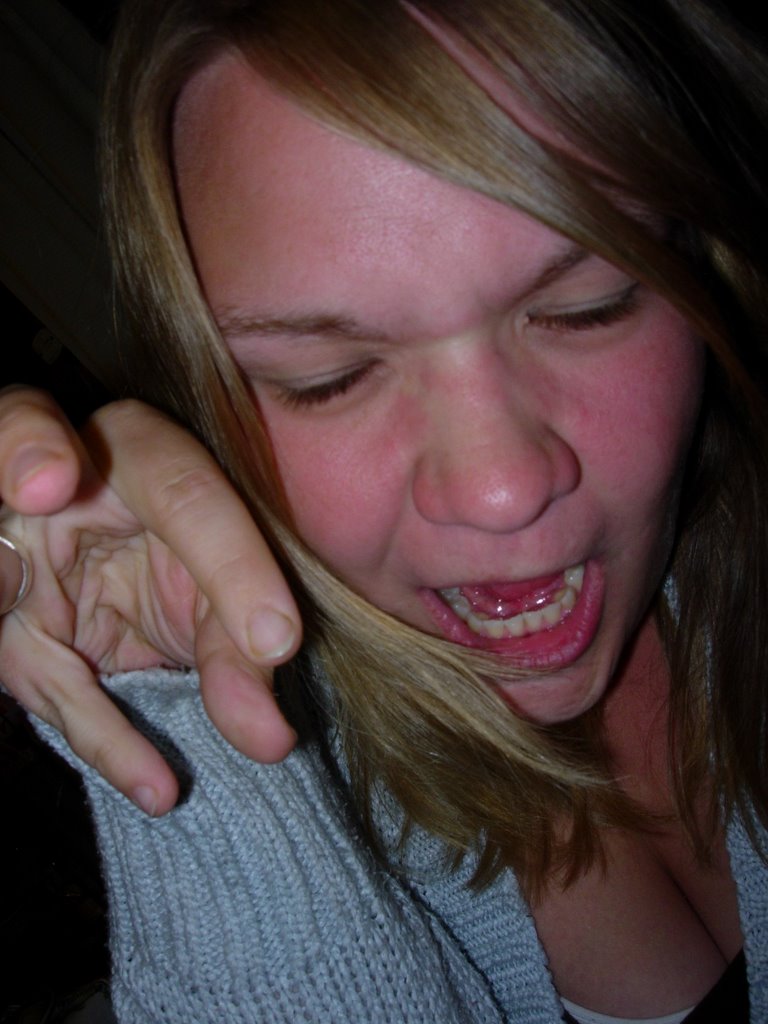As I prepare to head home, for what was supposed to be for good, I'm doing some thinking about what I'm coming back to.
I worked for six months in a school for children with mental disabilites, and got to know 5 children as well as I could. The situation was far from ideal for a number of reasons: My limited spanish, the rotating tias, behavioral issues. Sometimes I hear myself complaining about all of this and I think to myself "What did you expect Lauren? This is supposed to be hard. This is why you're here."
I was shocked by how difficult the past six months were. Everyday that I couldn't communicate with my tia, and everyday that I went home with bruises I was surprised that this was something I committed to. Beyond that, when I unofficially became the primary teacher for the class and spent hours trying to figure out how to keep them busy, I also lost sight of my real purpose in the class. My purpose was to be an extra set of hands, to get to know kids on a more personal level and support them in a way that the school couldn't.
I failed, and I can finally admit that.
I tried, but I didn't try hard enough. I played, but I didn't put my whole self into it. Mostly, I saw that something was happening, I thought that something was happening, and I didn't say anything.
On a Monday morning a few weeks ago, one of my girls came to class looking like she hadn't eaten in weeks, hadn't slept in days and was unable to focus or work. Something happened to her....anyone could see it.
But she couldn't tell me what had happened. She is shy with limited verbal skills. She sat in pain for an hour before one the tias finally said to me: "There is something wrong. We have to do something."
My first thought was of her brother. How during my first week, a tia sat me down and told me each child's horror story, of their poverty and neglect and abuse. I took it all in and didn't really hear it, not only because of the language barrier, but also because sometimes, there is only so much of what happens to children that you can really comprehend.
I put it all in the back of my mind, thinking my tia was being slightly dramatic, and trying to scare the gringa with how scary and horrible things are. I fooled myself into believe that because my kids had parents in their lives, they were better off.
So I knew that there was a possibility that my nine-year-old student was being abused by her brother. I knew and I didn't tell anyone. I assumed that if someone had told me, everything was being taken care of. It wasn't, and we were all to blame.
I blame her mother, for allowing her brother to live with her for so long. I blame the school's director, fo having to be convinced for an hour that we should call the police. I blame my tia for telling me that a child was being abused, and not telling me what to do about it. I blame everyone for putting me in a position that I wasn't qualified or prepared for. I blame myself for being the only one who saw that girl everyday and didn't say anything.
The nine-year-old told us, me and another tia who was helping me with the class, what happened to her. We had to coax her. Sunday had been her birthday. We asked her what she ate. We asked her about her presents. We asked her who hurt her.
The police came an hour later. They questioned us, asking over and over if we were sure we heard what we heard. I've never been more sure of anything. I feel asleep hearing her small voice repeating those three words. They took her away as quickly as they came. No one could find her mother (it isn't uncommon for people to change phone numbers, or not have a phone at all), so she would be at the gate at 1pm to pick up her daughter, and I'd have to explain why she wasn't there.
The rest of the school staff went to a meeting to discuss what happened. I wasn't invited, because I'm just a volunteer.
Life is hard. Choices are hard. The idealism that goes along with this job is a blessing and a curse. Its easy to feel like just by being in a child's life, with good intentions and a smile, is enough because so often it is. But there are times when you have to do more, when you can't be afraid to speak, or afraid to fail. There are times when idealism keeps you from seeing reality. There are times when you are going to realize that you aren't doing as much as you could be.
It all comes back to the little victories: The nine-year-old girl no longer lives with her brother, but in an hogar where we can visit, and check on her, and maybe put some constant volunteers. An autistic student finally learned my name. She asks for me when I'm not there.
We just keep learing. I'm convinced that my failure will actually make us better and will teach us something. At least I hope so.
I worked for six months in a school for children with mental disabilites, and got to know 5 children as well as I could. The situation was far from ideal for a number of reasons: My limited spanish, the rotating tias, behavioral issues. Sometimes I hear myself complaining about all of this and I think to myself "What did you expect Lauren? This is supposed to be hard. This is why you're here."
I was shocked by how difficult the past six months were. Everyday that I couldn't communicate with my tia, and everyday that I went home with bruises I was surprised that this was something I committed to. Beyond that, when I unofficially became the primary teacher for the class and spent hours trying to figure out how to keep them busy, I also lost sight of my real purpose in the class. My purpose was to be an extra set of hands, to get to know kids on a more personal level and support them in a way that the school couldn't.
I failed, and I can finally admit that.
I tried, but I didn't try hard enough. I played, but I didn't put my whole self into it. Mostly, I saw that something was happening, I thought that something was happening, and I didn't say anything.
On a Monday morning a few weeks ago, one of my girls came to class looking like she hadn't eaten in weeks, hadn't slept in days and was unable to focus or work. Something happened to her....anyone could see it.
But she couldn't tell me what had happened. She is shy with limited verbal skills. She sat in pain for an hour before one the tias finally said to me: "There is something wrong. We have to do something."
My first thought was of her brother. How during my first week, a tia sat me down and told me each child's horror story, of their poverty and neglect and abuse. I took it all in and didn't really hear it, not only because of the language barrier, but also because sometimes, there is only so much of what happens to children that you can really comprehend.
I put it all in the back of my mind, thinking my tia was being slightly dramatic, and trying to scare the gringa with how scary and horrible things are. I fooled myself into believe that because my kids had parents in their lives, they were better off.
So I knew that there was a possibility that my nine-year-old student was being abused by her brother. I knew and I didn't tell anyone. I assumed that if someone had told me, everything was being taken care of. It wasn't, and we were all to blame.
I blame her mother, for allowing her brother to live with her for so long. I blame the school's director, fo having to be convinced for an hour that we should call the police. I blame my tia for telling me that a child was being abused, and not telling me what to do about it. I blame everyone for putting me in a position that I wasn't qualified or prepared for. I blame myself for being the only one who saw that girl everyday and didn't say anything.
The nine-year-old told us, me and another tia who was helping me with the class, what happened to her. We had to coax her. Sunday had been her birthday. We asked her what she ate. We asked her about her presents. We asked her who hurt her.
The police came an hour later. They questioned us, asking over and over if we were sure we heard what we heard. I've never been more sure of anything. I feel asleep hearing her small voice repeating those three words. They took her away as quickly as they came. No one could find her mother (it isn't uncommon for people to change phone numbers, or not have a phone at all), so she would be at the gate at 1pm to pick up her daughter, and I'd have to explain why she wasn't there.
The rest of the school staff went to a meeting to discuss what happened. I wasn't invited, because I'm just a volunteer.
Life is hard. Choices are hard. The idealism that goes along with this job is a blessing and a curse. Its easy to feel like just by being in a child's life, with good intentions and a smile, is enough because so often it is. But there are times when you have to do more, when you can't be afraid to speak, or afraid to fail. There are times when idealism keeps you from seeing reality. There are times when you are going to realize that you aren't doing as much as you could be.
It all comes back to the little victories: The nine-year-old girl no longer lives with her brother, but in an hogar where we can visit, and check on her, and maybe put some constant volunteers. An autistic student finally learned my name. She asks for me when I'm not there.
We just keep learing. I'm convinced that my failure will actually make us better and will teach us something. At least I hope so.



